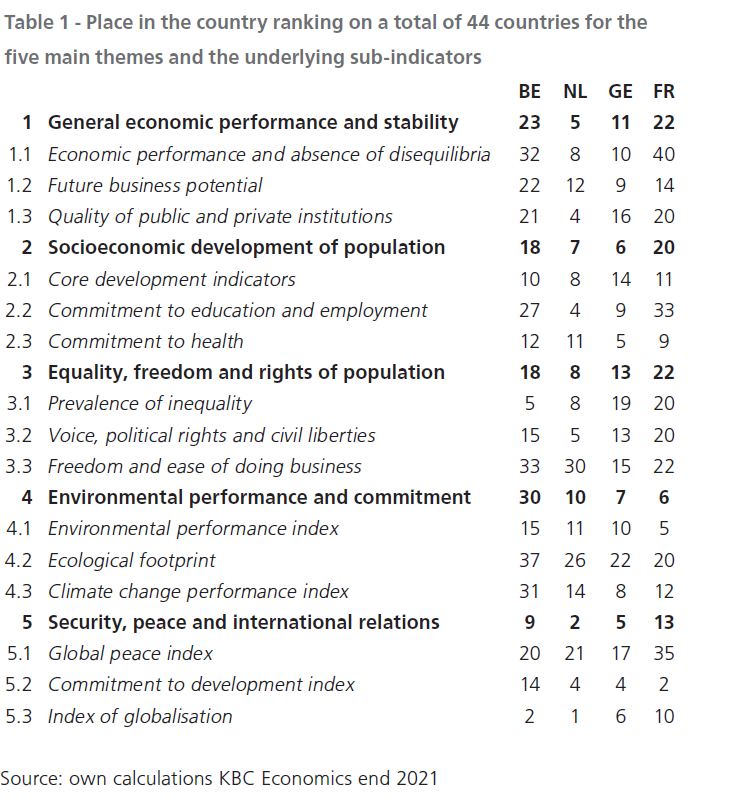Belgium can still step up a gear in sustainability


Since 2002, KBC Economics has calculated the sustainability profile of countries on an annual basis. This calculation serves as the basis for the investment choices in government bonds for KBC’s SRI (socially responsible investment) funds. Although Belgium is among the countries that are included in the socially responsible investment universe, its place in the general country ranking compared to relevant peers, such as neighbouring countries, is less rosy. Moreover, for two of the five themes examined (‘General economic performance and stability’ and ‘Environmental performance and commitment’), Belgium is among the 50% worst performing countries in the screening exercise. It is important that the Belgian authorities take the country’s sustainability performance to heart. After all, countries that invest in the sustainable promotion of the welfare of their citizens lay the foundations for favourable and stable political-economic development in the future.
We define a country’s sustainability as “the set of achievements, institutions and policy efforts that promote the well-being of the current and future population in a sustainable manner, without compromising the well-being of populations in other countries and the environment”. To measure it, we use a scoring model based on five themes: (1) General economic performance and stability, (2) Socio-economic development of the population, (3) Equality, freedom, and rights of the population, (4) Environmental performance and commitment, and (5) Security, peace and international relations. Each theme is in turn subdivided into three sub-indicators. A detailed description of the screening approach, as well as the most recent country ranking of developed countries (the KBC Sustainability Barometer 2021) and the criteria for inclusion in the investment universe, can be found in a new KBC Research Report published together with this opinion.
Belgium’s relative sustainability performance deserves extra attention. The good news is that Belgium belongs to the group of developed countries that qualify for inclusion in KBC’s SRI investment universe. More precisely, in the latest update of the country screening, finalised end 2021, Belgium obtains 16th place out of a total of 44 countries considered (that is the OECD countries supplemented by the (candidate) EU member states that are not members of the OECD). It is in itself a good result, but a two-place drop in the ranking compared to the previous calculation at the end of 2020. Moreover, when we compare Belgium with more relevant peers such as its neighbouring countries, Belgium’s sustainability performance is less rosy. Especially the Netherlands and Germany, but also France, do better, at 6th (unchanged), 4th (two place improvement) and 13th (one place deterioration) in the latest ranking, respectively. Within the eurozone, there are countries, especially in Southern Europe, that score (much) worse than Belgium. But even compared to the average ranking of the eurozone countries (15), Belgium’s score is mediocre.
Figure 1 shows the relative performance of Belgium compared to its three neighbouring countries since the KBC Sustainability Barometer was first calculated in 2002. The additional countries taken into account in successive annual screening exercises (e.g. because the required figures became available) are not included in the figure so as not to distort the comparison with previous years. Belgium consistently scored worse than the Netherlands and Germany over the entire period 2002-2021. The position relative to France was alternately worse or better, but since 2017 the Belgian score has also been below that of France.

When we zoom in on the five sustainability themes, Belgium’s position in the country ranking is the highest (9th place) for the 5th theme (‘Security, peace and international relations’) (see Table 1). This is mainly due to its strong international openness, as reflected in the ‘Index of globalisation’. But for the sub-indicator ‘Commitment to development’, which measures the countries’ international development aid, Belgium scores notably lower than its three neighbours. For the 2nd and 3rd theme, the Belgian score is still reasonably good (18th place) in the group of 44 countries considered. Both the Netherlands and Germany again score much better, however. For the 2nd theme (‘Socio-economic development of the population’), this is due to Belgium’s relatively weak result for the indicator that measures the performance and policy efforts with regard to education and labour participation of the population. What is striking about the 3rd theme (‘Equality, freedom and rights of the population’) is the large gap between Belgium’s very good performance in the area of inequality among the population and its very poor performance in terms of ease of doing business.
Relative underperformance
Belgium’s score is not good for the 1st theme (‘General economic performance and stability’) and downright bad for the 4th theme (‘Environmental performance and commitment’). With a poor 23rd and 30th place respectively in the ranking, Belgium is among the 50% worst performing countries in the screening exercise for both themes. For the sub-indicators of the 1st theme, Belgium scores manifestly worse than the Netherlands and Germany. Not only are the past economic performance and imbalances much better in those two countries, also the future economic potential and the quality of the institutions there are (much) better than in Belgium. For the three sub-indicators of the 4th theme, Belgium’s performance is always (significantly) worse than that of all three neighbouring countries. It is clear that Belgium still has a long way to go in the area of the environment if it wants to leave behind its relatively unsatisfactory score.

Countries that invest in the sustainable promotion of their citizens’ well-being thereby lay the foundations for favourable and stable political-economic development in the future. The sustainability ranking of countries, in combination with the traditional ratings of credit rating agencies, is thus a powerful tool for assessing the risk of government bonds and making better-informed investment decisions. It is therefore important that the Belgian authorities take the sustainability performance of Belgium to heart.
